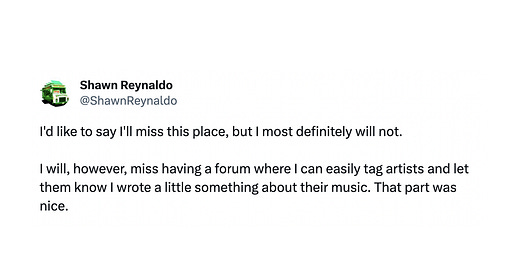A Requiem for Techno Twitter
a.k.a. People who want to talk about electronic music no longer have a central place to go.
A few days ago I had an unexpected thought: “Do I actually miss Techno Twitter?”
Although Twitter still very much exists—and continues to be a place where DJs and other electronic music people post their assorted thoughts, opinions and promotional material—there’s no question that the platform has lost some of its mojo in the months since Elon Musk took over. At least within the electronic music world, it’s obvious that not only are fewer people posting than before, but those who’ve stuck around are now seeing significantly less engagement.
Last week I published an essay called “Being a DJ Is Embarrassing.” There’s a decent chance you saw it, because in less than seven days, it’s quickly become the most popular thing I’ve done in 2023. In fact, it’s already one of the Top 5 most widely read pieces in the history of the newsletter.
I don’t say that to gloat. Obviously I’m happy whenever something I write seems to resonate with readers (and the wider electronic world), but what really struck me about the success of last week’s piece is that so few its readers were directed to the article via social media. According to Substack’s back-end analytics, only 4% of the article’s total audience arrived via Instagram. Twitter didn’t make the list, and neither did any other social media platform.
That’s a strange result, and one that up until just a few months ago, would have been exceedingly unlikely. Although Twitter has never been a huge traffic driver for most media outlets (including this newsletter), it did in recent years become the de facto home of electronic music discourse. It was a place that sparked conversation, and whenever an article I wrote generated a larger-than-usual response, there was a very good chance that at least some folks on the platform were talking about it.
During the last six months, however, that spark seems to have dimmed significantly. I thought I’d be happy about that, and in some ways, I am. Even in the tiny corner of the platform occupied by electronic music, Twitter was often something of a nightmare, a place where mean-spirited “dunking” and empty virtue signaling were routinely rewarded by an algorithm that incentivized conflict. Nihilistic shitposting and mob-like pile-ons were a regular part of the experience, and although the site was never really a space for civil exchanges and nuanced discussions, people in electronic music—artists and journalists in particular—often felt obligated to be on the platform regardless, partially because they needed a place to promote their work, but also because seemingly everyone else was on it too.
Musk’s official arrival late last year prompted an immediate avalanche of Twitter eulogies, along with a kind of online rubbernecking as people excitedly waited for the site to suddenly implode. This was my contribution to the “Twitter is going to die” conversation:
At that point, exasperation is the word that probably best defined my relationship with the platform, and the prospect of being released from its shackles sounded like sweet relief. I figured (or at least hoped) that once the site kicked the bucket, all that time and energy we’d all become used to investing in Twitter could potentially be directed toward new spaces—and new ways of communicating, preferably without the invisible hand of an algorithm pushing us all to become our seemingly worst selves.
Unfortunately though, those new spaces have yet to emerge. Although several companies have pitched themselves as potential Twitter replacements, the initial hype around Mastadon seems to have fizzled, Bluesky is still in a private, invite-only beta and Spoutible is just getting off the ground. Substack introduced the Twitter-esque Notes back in April—prompting Twitter to obnoxiously strike back by directing its algorithm to automatically bury all Substack content on the platform—but it has yet to gain much traction either. (As far as I can tell, only Substack authors seem to be using it; Substack readers, on the other hand, don’t seem to be terribly interested in participating.)
For all its many, many flaws, old Twitter was at least a place for electronic music folks to go when they wanted to know, “What are people talking about today?” The current zombie version of Twitter no longer adequately fills that role, and the discourse has fragmented as a result.




